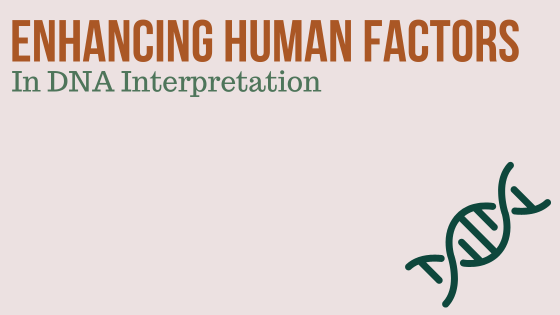The study of human factors in forensic science has emerged as an essential component in understanding the interaction between humans and the systems they use. Through a human factors lens, we can recognize and address potential errors and biases, shape a positive laboratory culture, improve work productivity and quality, and enhance the communication of scientific results. To delve into this critical topic, we are excited to present a workshop at the International Symposium of Human Identification in Denver on Sunday 17th September that focuses on the study of human factors in forensic DNA interpretation.
The workshop will bring together experts from the National Institute of Standards and Technology National Institute of Justice Expert Working Group on Human Factors in Forensic DNA Interpretation. This group has spent 3.5 years evaluating scientific literature and technical knowledge to develop recommendations aimed at improving practice and reducing the likelihood of errors in DNA interpretation. Workshop participants will gain valuable insights into key areas such as management, quality assurance, education and training, technology implementation, communication of results, and the interpretation of DNA results in relation to alleged activities.
By attending this workshop, participants will benefit from a range of learning outcomes that can be applied to their forensic DNA analysis practices:
- In-depth Knowledge: Gain comprehensive knowledge of the NIST/NIJ EWG recommendations pertaining to management, quality assurance, education, training, technology implementation, and result communication.
- Practice Implications: Understand how these recommendations improve the practice of forensic DNA interpretation and their direct implications for participants’ own work.
- Error Culture: Acquire practical tools to foster a positive error culture within forensic DNA laboratories, ensuring continuous improvement and learning from mistakes.
- Human Factor Considerations: Recognize the importance of human factors in managing forensic DNA laboratories, developing quality management systems, and shaping the training and continued education and training of DNA analysts.
- Bias Mitigation: Identify strategies to mitigate cognitive bias and improve review procedures.
- Implementation of New Techniques: Gain practical tools to thoughtfully implement new techniques, technologies, or methods within forensic DNA laboratories.
- Contribute to the Debate on DNA Results and Activity-Level Propositions: Become familiar with the limitations and different viewpoints surrounding the evaluation of DNA results when responding to questions related to alleged activities.
This workshop is designed for a diverse range of professionals involved in forensic science, including DNA analysts, forensic practitioners, laboratory management and leadership personnel, quality assurance/control personnel, forensic DNA researchers, legal practitioners, education/training facilitators, certification/licensure bodies, and probabilistic genotyping software developers. No prerequisite knowledge is required, making it accessible to all interested individuals. Join us to be a part of this transformative workshop and be part of the change needed in forensic DNA interpretation.
WOULD YOU LIKE TO SEE MORE ARTICLES LIKE THIS? SUBSCRIBE TO THE ISHI BLOG BELOW!
SUBSCRIBE NOW!


